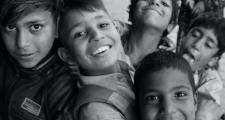Social workers are vital to young asylum seekers in ‘biased and racist’ system

Social workers can be game changers when it comes to dealing with the challenges involved in supporting young asylum seekers in the UK.
That was the key message in a webinar held during World Social Work Month organised by the Scottish Association of Social Work (SASW).
Supporting Young Asylum Seekers in the UK: A Look at Social Work in Our Communities invited social workers across the UK to come together and reflect on compassionate, community-based practices that can help unaccompanied children seeking asylum thrive.
Vivien Thomson, children and families policy and practice lead for Social Work Scotland, said: “Unaccompanied asylum seeking children, children who have felt discrimination and so much more than that, have arrived not by design. They might be at the mercy of traffickers. They might be resilient, but that trauma is still there.”
Describing their unique experiences, she added: “They are managing the unfamiliar and so often are social workers dealing with unfamiliar situations.
“This is where our skills come to the fore; tackling the dilemmas and challenges of young people.”
Thomson said there were many unique aspects about working with unaccompanied asylum-seeking children and that as well as language and culture it involved understanding the nature of their trauma.
She said: “Their experiences are not what we are used to dealing with. It is important that we find out as much as we can about their journey and walk in their shoes.”
She also said that social workers had to deal with the unknown daily and urged those working in this area to “be brave” and use support that is available.
She added: “We really are game changers and your work really makes a difference. It really matters. Let’s celebrate our game changers.”
Immigration lawyer Francesca Sella, of Just Right Scotland, Scotland’s legal centre for justice and human rights, added: “In my experience social workers can make a huge difference in young people’s lives. Your work as social workers touches on everything we support.”
She said that 3,567 age disputes were raised by the Home Office between January and June 2024 and 53 per cent of young people assessed as adults were later found to be children, though this figure is likely to be higher as the number of age disputes is increasing.
Sella also emphasised the importance of lawyers and social workers working together. She said: “Communication between legal representatives and social workers is key.
“The more info you can share the easier it will be for the dispute to be resolved.”
Speaking about refugee family reunion she said: “This is when everything goes well and young people get asylum status.
“It is complex. I could be working with a young person for five years to get from start to finish. Your support throughout this is crucial and, as Vivien said, a game changer.”
Age assessment and disputes was also highlighted by Jo Schofield, a director of private company Immigration Social Work Services.
She said: “We are seeing a massive increase in age disputes being raised by the Home Office which is having a massive impact on the children we work with.
Too many children are being wrongly assessed as adults and placed in prisons, charged with criminal offences and missing out on vital services.”
Posing the question what do young people seeking asylum need from the social work profession, Ms Schofield said: “They need to be recognised as minors first and migrants second. They are some of the most vulnerable children in our care and require support. Young people from the moment they arrive who hit a wall of disbelief and suspicion.”
Branding the system ‘biased and racist’ Ms Schofield added: “We need to recognise that and fight for those rights to be upheld. Young people who arrive are treated differently to our citizen children.”
Schofield called for social work leaders who understand the needs of asylum-seeking children, which is too often seen as a specialist area of social work.
She also called for universities to teach more about this area of work and a collective push for systemic change where all children are treated equally regardless of their immigration status.
Social workers also need training, support, research and resources to do their jobs effectively and should work collaboratively, according to Schofield.
She said: “Social workers are already doing amazing work in this field. We need to share research, ideas and perspectives so that all children benefit from this practice.”
Abolish National Age Assessment Board call
An amendment to scrap the Home Office's National Age Assessment Board and the use of 'scientific' methods of age assessment has been tabled to the Border Security, Asylum and Immigration Act following lobbying by BASW.
The board, which employs social workers, was set up by the Home Office to remove responsibility for determining the age of aslyum seekers from local authorities.
It has been vigorously opposed by BASW which urged social workers not to work for it warning of "political priorities intruding on professional objectivity".
Scientific methods of age determination, such as using X-rays, MRI scans and dental examinations have also been criticised by the BASW. Chief executive Ruth Allen said there is "no evidence" that biological methods are more accurate, adding age assessments need to be done "holistically" rather than by a "machine".
The amendment to the act has been tabled by Lib Dem MPs Lisa Smart and backed by fellow Lib Dem MPs Susan Murray and WIll Forster. BASW is urging social workers to write to their MP urging them to vote for the amendment.
